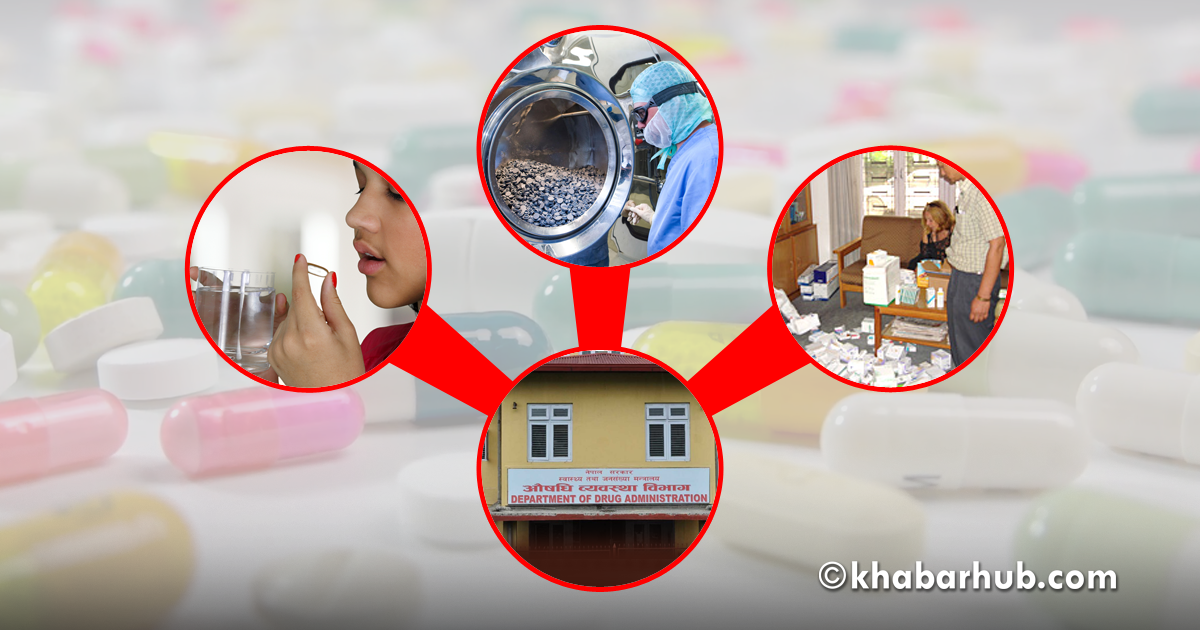0%

KATHMANDU: Growing investment in the medicine industry is redeeming Nepal from its dependence on the import from other countries.
The data provided by the Department of Drug Administration shows that the country is on its way of standing on its own products in most of the medicines required for its people if not in all. In 2 years, 37 new pharmaceutical companies are registered.
The newly registered pharmaceutical companies are said to have made a promising investment of up to 350 million rupees.
The Department informed that 37 new large companies including LICA Pharmaceuticals, Rajdevi Pharmaceuticals, Pokhara Pharmaceuticals, Everest Pharmaceuticals Pvt. Ltd. have come to the arena.
Although the transaction of Nepali medicine has increased, it has not been able to substitute foreign products. In past 7-8 years, Nepali drugs/ medicines are confined to only 40-45% of the total market in Nepal.
According to the Department of Drug Administration, the new companies will manufacture medicines like tablets, syrup and ointment. The enthusiasm and proposed investment in the sector are promising enough to make Nepal independent in most of the medicines required here, said VivekGautam Pharmacy Officer at the Department.
Talking about the department’s focus, he further said, “Although it is affirmative to welcome more new companies, the government is more enthusiastic about their output, rather than the investment.”
Nepal is still dependent on foreign medicines till date and everyone is optimistic about the outcome of the enthusiastic entrepreneurs’ arrival.
Indian companies have a stronghold
380 foreign companies are involved in the supply and manufacturing of medicines in Nepal. Even in the companies manufacturing medicines, the large number is of the Indian companies. Even in foreign companies occupying stronghold in Nepal, Indian companies outnumber the rest.
“Medicines produced by Indian companies hold 53% of our medicine market whereas Nepal’s production is 45%.”Biplav Adhikari, the spokesperson of Nepal Drug Manufacturers’ Association told Khabarhub.
Estimating that nearly 70 million rupees is spent on importing Nepal, Adhikari said, “ Now the government has to change the policy in such a way that instead of importing medicine, the raw materials needed are imported from outside.”
According to the Department of Customs, Nepal has been importing medicines from 50 countries including India, Bangladesh, China, Belgium, Germany, and Indonesia. The consumption of Nepali medicines in Nepal is nearly 55 million rupees per day.
Pharmaceutical entrepreneurs complain that the government has not played enough to promote Nepali industries. They claim to have increased the contribution of domestic products on their own, yet they think the Nepali market cannot fare them better unless the government upholds them.
Although the transaction of Nepali medicine has increased, it has not been able to substitute foreign products. In past 7-8 years, Nepali drugs/ medicines are confined to only 40-45% of the total market in Nepal.
Although the government has made nearly half dozens of decisions in the name of promoting domestic production, entrepreneurs blame the government for not enforcing its own decision effectively.
Nepal National Medicine policy-2007 had targeted to manufacture 80% of the most essential medicines in the country within 10 years of the promulgation of policy; however, the target is still a distant cry.
National Health Policy -2015 had the policy of promoting the internal manufacture ensuring the quality and supply of the medicine; it had the provision of by Nepali products even if that is 15% more expensive than the foreign products. The policy got dismissed before becoming effective.
It is found that despite the availability of Nepali products, the government has not taken any action to stop 30 types of medicines.
‘Empower Nepali manufacturers’
The government has adopted the policy of making Nepal self-dependent in medicine in two years. However, the pharmaceutical entrepreneurs are skeptic about the policy as the words are not sufficient unless more specific and realistic strategies are set to meet them.
“It is good to welcome investment through the pharmaceutical industry,” said Adhikari, the spokesperson of Nepal Pharmaceutical Association.
“Unless the government is serious about ensuring the security of the investment and the priority of Nepali medicine, the policy can’t get materialized,” Adhikari added skeptically.
The entrepreneurs demand that the government should restrict the free access of foreign medicines in the Nepali market and encourage Nepali products.
Proper monitoring of the regulatory agency can help find out the demand for the medicines, their current production, their potential and the policies the government has to adopt in the days to come.
“The government should help the pharmaceutical entrepreneurs find the challenges lying in the industry and make them ensure the quality of the medicine so that the product can be competitive in foreign markets in the long run,” Adhikari said about his expectations from the government.